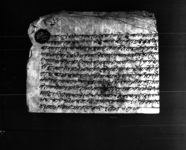A written power of attorney granted by Rājakumārī Pãḍenī Chetryānī (VS 1943)
ID: K_0175_0060
Edited and
translated by Rajan Khatiwoda
Created: ;
Last modified: 2019-11-11
For the metadata of the document, click here
The accompanying edition, translation/synopsis and/or commentary are available under the terms of the Creative Commons Attribution-ShareAlike 4.0 International License
Abstract
In this legal document Rājakumārī Pãḍenī Chetryānī grants Vedanārān Pādhyā power of attorney to represent her in a court of law.Diplomatic edition
[1r]
श्रीः\४४1 [Seal of Rājakumārī Pãḍenī]2 1लिखितम्नरदेवीटोलवस्न्याराजकुमारिपडेनीछेत्र्यानीआगेसो2हिटोलवस्न्यारत्नकुमारिपडेनीछेत्र्यानीकोरमेरागुठिढुकुटिका
3काझगडामुद्दामानीजरत्नकुमारिसंगमेरोसट्टाजोरीपुर्पछे
4गर्नालाईनरदेवीटोलवस्न्यावेदनारान्पाध्यालाईवारिस्ग
5रिपठायानीजवारिस्लेनीजझगडीयासंगजोरिपुर्पछेग
6र्दाहार्यादंन्डजीतेजीताऊरिस्मेत्जोपर्याकोमामेरोमं
7जुरछकालकलावारिस्लेगर्याकोमामेरोचीत्तवुझ्दैन
8भनीउजुरगर्याभंन्याझुट्टागरिदिनुऐनवमोजींम्वुझाउला
9मेरामनोमान्षुसिराजीसंगवारिस्नामापत्रलेषिदिञाँ
10साछिनरदेवीवस्न्यावेदनीधीपाध्या१ऐंवस्न्याहरिकिस्नपाध्ये
11अधीकारीलेषकसाछिप्रयागदत्तपाध्याईतीसंम्वत्१९
12४३सालमितीश्रावणवदि६रोज५सुभम्----
Translation
[1r]
44
[This is a] written [statement of] Rājakumārī Pãḍenī Chetryānī, a resident of Naradevī Ṭola. Āge: I [hereby] appoint and do send Vedanārān Pādhyā, a resident of Naradevī Ṭola, to represent me and present opposing arguments on my behalf in the legal dispute between Ratnakumārī Pãḍenī Chetryānī, resident of the same Ṭola, and me concerning the guṭhī's treasury. No matter whether the said attorney, having presented opposing arguments against the said litigant is defeated or wins, I will accept [the outcome], be it a fine or winning fee. If I lodge a complaint in the future that I am not satisfied with my attorney's performance, treat is as untrue. I will accept [whatever is decided] in accordance with the law (ain). I issue this written power of attorney of my own will and volition.
The witnesses to my statement are: Vedanīdhī Pādhyā, a resident of Naradevī [----] 1, Harikisna Pādhye Adhīkārī, resident of the same, and Prayāgadatta Pādhyā, the scribe [of this document].
Thursday, the 6th of the dark fortnight of Śrāvaṇa in the [Vikrama] era year 1943 (1886 CE).
Commentary
This document is part of an extant set of documents which deal with a family dispute between Rājakumārī Pãḍenī (the lawfully married wife of Pṛthī Bahādura) and Ratnakumārī Pãḍenī (the wife of Rājakumārī's husband’s younger brother). In the present document, Rājakumārī grants power of attorney to Vedanārān Pādhyā to represent her in a court of law for this family dispute. The witnesses mentioned in the two written powers of attorney granted by Ratnakumārī (K_0175_0059) and Rājakumārī (the present document) show that their neighbours were divided into two groups, one supporting Rājakumārī and the other supporting Ratnakumārī. The present written power of attorney, which follows the guidelines laid down in the Mulukī Ain (MA-KM 1854 35.24), testifies to the extent to which the Ain made itself felt in daily life. It was Ratnakumārī having granted power of attorney (K_0175_0059) that led Rājakumārī to do the same.

